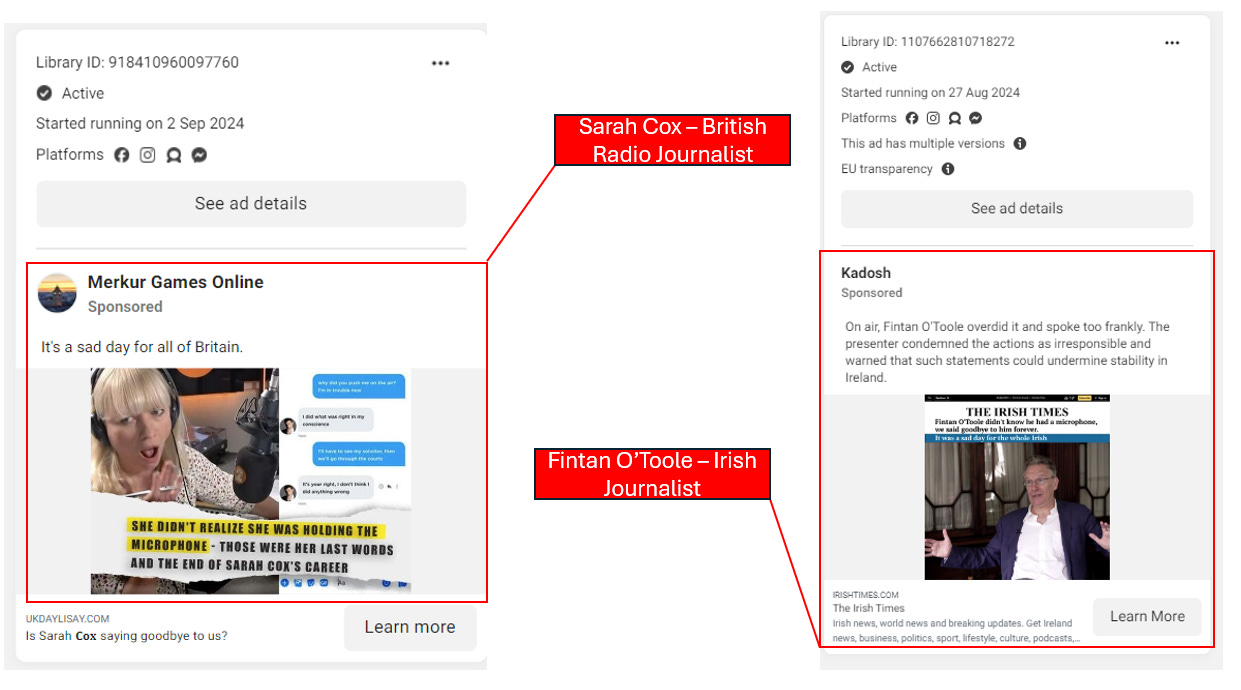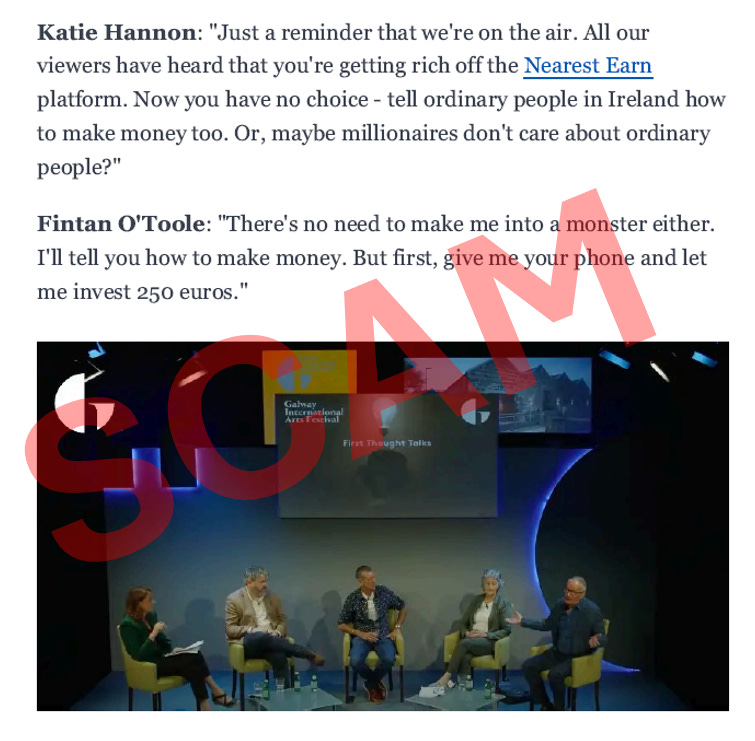Today I found out from Facebook that I had died.
I am not dead, but my image, along with many others, is being used as part of a global crypto scam that creates fake news about real people and is deployed through Meta's ad platform
Today on Facebook I saw an ad that included a photoshopped photo of myself with a black eye, being restrained by riot police. It was meant to look as if it were a headline from the Gulf Daily News, a Bahrain-based English language daily. The text read “Marc Owen Jones did not know that the microphone was on, we are saying goodbye to him forever”. Of course I was somewhat shocked, I had become part of a scam that I had been researching (Also, spoiler alert, I am in fact, alive).
For some background, the above ad is one of a long running, seemingly connected scam that has been running on Meta platforms for almost a year. It is also running on X. The scale of it is alarming, as its longevitiy. The fact Meta seem unable to counter this scam using images of real people on its advertising platform is disturbing to say the least.
How it works: Hot mic pandemic
Whoever is running the campaign seems to do a number of things. They use hijacked or repurposed Facebook pages to launch ad campaigns. The below image shows how a page called ‘Flor De Sacuanjoche’ is running ads about Nigerian journalist, media entrepreneur and television host, Kadaria Ahmed. Again, the same type of language is used, with the phrase “Kadaria Ahmed didn’t know the microphone was on, we say goodbye to her forever”. The ad is meant to mimic an ad from the Nigerian news outlet ‘Vanguard’
If you look into the page info you can see that the page used to be some Nicaraguan religious page, but hasn’t really posted since 2021. It has changed its name twice, and is run by people in Lithuania, Pakistan and Ukraine (this information is not all that helpful in determing who is actually running the page though).
As of 20th March 2025 the page was running around 40 different live ads, many in a similar format to that above, others in Brazilian Portugese - all looking like crypto scams.
A few more examples, a page called ’Merkur Games Online’ running a fake ad about British journalist Sarah Cox, the one on the right a page called Kadosh running a fake ad using Irish journalist Fintan O Toole.
(Most of the ads were found by searching the Facebook ad library with the phrase ‘microphone sad’ and ‘running to ATMs’.) Again, I found hundreds of these ads, but there is likely thousands. Some have been running for nearly a year seemingly without being taken down, like this one of Prince Nasser bin Hamad Al Khalifa of Bahrain
The Targets
Just a reminder that I have counted over hundreds of these ads, but there are probably thousands of these ads running simultaneously. The scam campaign has targeted a diverse array of prominent figures spanning multiple continents and professions, from princes (literally) to politicians, entrepeneurs to journalists. Among them are business leaders like Strive Masiyiwa, the Zimbabwean billionaire founder of Econet Wireless; Alwaleed bin Talal, the Saudi royal and investor; and Bader Al-Kharafi, CEO of telecommunications company Zain Group. Political figures caught in this net include Rachel Reeves, the British Chancellor of the Exchequer; Danny Faure, former President of Seychelles; and Basuki Tjahaja Purnama, Indonesia's former Jakarta Governor. The media sector is represented with journalists and broadcasters like Sara Cox of BBC Radio, Carlos Fernando Chamorro, a Nicaraguan editor, Kadaria Ahmed, a Nigerian media entrepreneur, and Fintan O'Toole, an Irish journalist and literary editor. Entertainment figures include Rashmika Mandanna, an Indian actress working in Telugu and Kannada cinema, and Connie Ferguson, a South African actress and filmmaker, Keanu Reeves, aka Neo. Royal family members include Nasser Bin Hamad Al Khalifa, a member of the Bahraini royal family and military officer. The campaign also targets social media personalities like Khalid Al Ameri from the UAE, Vusi Thembekwayo from South Africa, and business executives including Jason Chen of Acer and Yasir Al-Rumayyan, who governs Saudi Arabia's Public Investment Fund. There are so many targets, I am still documenting dozens.
The geographical diversity of these targets spans Africa (Zimbabwe, South Africa, Nigeria, Botswana), the Middle East (Saudi Arabia, UAE, Qatar, Bahrain, Oman, Kuwait), Asia (India, Indonesia, Taiwan), Europe (United Kingdom, Ireland, Belgium, France, Bulgaria etc), the Caribbean (Trinidad and Tobago, Puerto Rico), and the Indian Ocean (Seychelles). This targeting across over fifteen countries involves public figures from multiple regions and sectors.
While some of the photos seem to be just lifted from the internet, others have been photoshopped, or generated using AI. Some, like mine, include giving the person a black eye. I have found some, in the case of Polish actress Katarzyny Cichopek, that are highly pornographic. Many of these ads, according to FB’s EU transparency requirements, reached audiences of thousands.
Finance 24, one of the pages running the scams, has about 150 ads that are still on the ad library database. Just one of the ads was seen 7439 times. Now if we consider the entirety of all these campaigns, the viewership is likely to be in the hundreds of thousands.
The Scam
While the techniques have evolved over time the basic premise seems to be to spoof a real life news outlet. Once the link is clicked the user is taken to a scam that in many cases resembles the a real news website. See this example of Fintan O Toole, the Irish journalist.
The article that the misleading link routes to features a fake transcript of (in this case Fintan O’Toole) an interview so salacious it had to be stopped by the Bank of Ireland! In it O’Toole is talking talking with another journalist Katie Hannon about how he made a lot of money through a platform called ‘Nearest Earn’, an AI-powered crypto scam.
At the end of the interview there are some instructions about how to invest with a minimum of 250 Euros. The “Nearest Earn” platform claims to be a platform that uses AI to time investments in cryptocurrencies.
A few people have noticed the scam, but there has only been fragmented reporting on it, often based on journalists seeing ads targeting figures in their respective countries. Here, Extra.ie covered the Fintan O Toole/Katie Hannon part of the scam. Timesnownews reported on one ad targeting Amitabh Bachcha. Khaleej Times noted some of the scams targeting Gulf officials using the Khaleej Times branding. The Guardian reported on what seems to be the same campaign targeting the UK Chancellor of the Exchequer Rachel Reeves back in October 24. However, the people behind the campaign were still running Rachel Reeves ads in March 2025 - targeting audiences in the UK in this case. The scam appeared the same, but instead of Nearest Earn, the platform was called Quantum AI
The general public have taken note. In this forum post, someone commented on how they’d seen similar posts about Graham Norton. In 2023, someone saw a similar post about Rod Stewart. Some of the discussions express disdain at Facebook. One person said ‘Facebook are knowingly funded by crime”.
Deep/Cheapfakes
It seems to be quite clear from the timing of the reporting that the campaign has been running well over a year, at least since 2023, and presumably Facebook have been making money from these ads, which seemed to be paid in multiple currencies, including US dollars and Turkish Lira. They are increasing in sophistication thanks to cheap AI editing tools, or at least cheap video editing tools. The below video targeting Qatar shows a faked video of Qatari Prime Minister Sheikh Mohammed bin Abdulrahman bin Jassim bin Jaber Al Thani. If you watch the video the lip syncing is very good, although bizarrely, the scammer has decided to use a South Asian accent!
In this particular case. The ad led to a page the displayed interesting behaviour. Everytime the link was refreshed it would actually go to a different, Qatar-based news outlet. So one refresh would lead to Peninsula, the next Doha News, the next Al Jazeera English, and so on.
Other behaviours
Another more recent aspect of the scam, perhaps to evade detection, is that each ad would serve multiple different versions, the majority of which were links to inoccuous items on sites like Amazon.com - but then serve one that was a clear scam ad.
It should be noted too that this particular campaign appeared to be paid for in Turkish Lira.
Conclusion
The scale and persistence of this cross-continental scam operation targeting public figures through Meta's advertising platform raises serious concerns about platform governance and user safety. For nearly a year, these scammers have:
Hijacked dormant Facebook pages to launch fraudulent cryptocurrency investment schemes (or set up new pages)
Created deepfake/cheapfake videos with increasingly convincing manipulation (at least to some people)
Targeted hundreds of prominent individuals across more than fifteen countries
Mimicked legitimate news outlets to create an appearance of credibility
Employed technical evasion tactics to avoid detection
Despite several reports from journalists and users across different regions, Meta appears unable or unwilling to effectively counter this campaign. It is unclear how many people have fallen for the scam, which appears to be brute forcing Meta’s ad platform with remrakable success.
As AI tools become more accessible and these scams grow more sophisticated, platforms must develop more robust detection systems and prioritize user safety over advertising revenue. Until then, users should remain vigilant against sensational claims involving public figures, especially those promoting investment opportunities through unfamiliar platforms.
I will update this when I’ve collated more results, but in the meantime, here’s Keanu Reeves saying goodbye (forever).






















